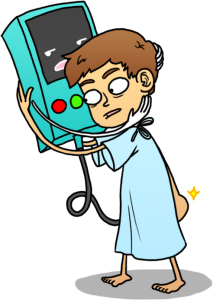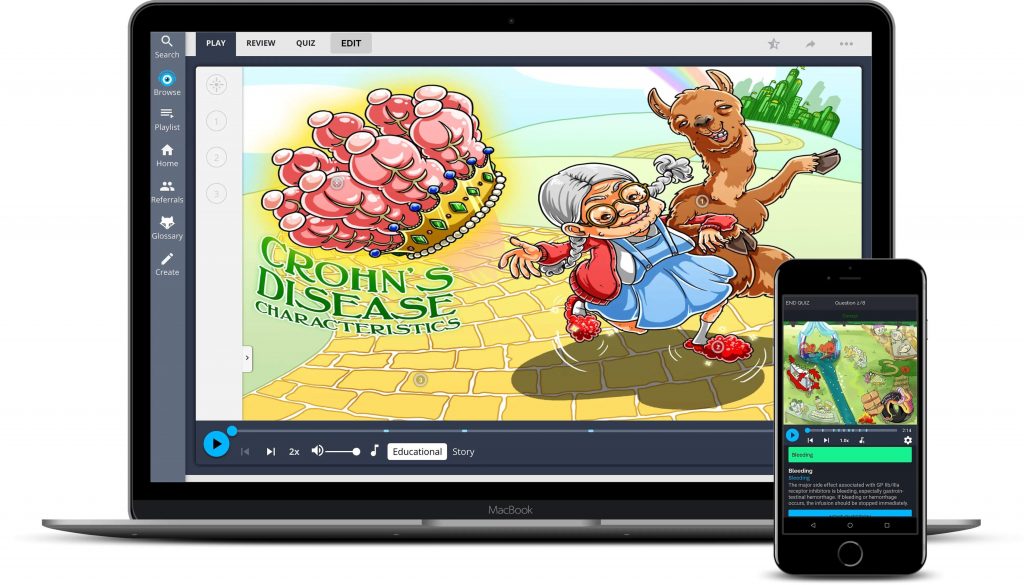
In the first blog of this series covering nursing study tips, we covered how to take notes like a nursing school ninja. Now that you’ve got the best notes in class, how do you study ninja-style? Below we compiled the greatest nursing study tips, passed on to us by our nursing school ninja predecessors.
1. Get Organized

Are you tired of hearing us say to get organized? What if all of our study cards were just slapped on one page with no organization method or search feature? You’d be pretty upset, right? It would take you extra time to sort through them and see what you have.
Our point exactly. Getting and staying organized saves you precious time when you sit down to study. Organize your notes and related materials, so you can grab what you need and keep your study focused and sharp like a ninja star!
2. Be Regular

This is one of the cornerstones of our nursing study tips: study a little bit each day. You’ll retain more information doing this than binge studying the night before the exam. A nursing school ninja is not born overnight.
Picmonic offers a custom daily quiz to keep you on your game!
3. Think About Your Patients

As a nursing student inundated with tests and class and studying, it’s easy to lose sight of why you’re doing this. So while you’re memorizing facts or data, also think about how you would talk to a patient about his condition. You certainly couldn’t just spew medical jargon and data at him, you’d have to explain the condition or treatment in terms a patient would understand. Self-test: if you can do this, you definitely know the material.
Plus, this tactic will actually make you a better nurse.
4. Pick Your Study Group Carefully

There is huge merit to studying in a group. You can:
- • Quiz each other
- • Teach each other the material
- • Copy notes you missed
- • Compare notes to see if you have everything
- • Commiserate about no life outside of nursing school
In a study group, it’s also easy to waste a lot of time. Gossip and too much commiserating can get in the way of productive study time. Don’t be a victim of this.
You will also find that different people study together differently. Some people will want to talk out every theory and topic, while others want to work individually and then silently compare notes at the end. Some nursing students love quizzing, others hate it.
Get to know your own study style before you go looking for a study partner or group. That way you can find someone like-minded, rather than finding out halfway through that it’s not me, it’s you.
5. Study Smart

Though your instructors will assign many chapters plus outside materials to you each week, you can’t possibly memorize everything. So instead of spreading yourself thin across too much material, think of what your teacher spent the most time reviewing in class. Focus on these key points for the bulk of your studying.
6. Take Scheduled Breaks

You may think you’re preparing by studying four hours straight, but your brain says otherwise. The human brain (and body) needs breaks to re-energize. Set a timer and make sure you get up and move around for 10 minutes of each hour. Perhaps put on your favorite song and have a dance party. Or go stand in the sun and soak up that vitamin D. Make sure to give your mind and your butt regular breaks, so you can return with ninja-like focus.
7. The Most Important of all Nursing Study Tips: Use Science Backed Study Materials
We have 4 reasons that Picmonic is the best way to learn complex information and retain that info for later tests:
- Research doesn’t lie.Picmonic is proven via a randomized, double-blind, controlled study, to improve students’ ability to recall complex information at a later date. When compared to textbooks and lecture notes, students improved their long-term memory retention by 331% just by using Picmonic.
Adv. Med. Educ. Pract. 2014 May 8; 5: 125-32 doi: 10.2147/AMEP.S61875. eCollection 2014 - Dual-coding Theory. This theory states that the creation of mental images enhances learning. Why you ask? Because visual and verbal information are processed differently and along distinct channels in the brain, creating separate representations for information processed in each channel. Two channels are more powerful than one. Simply put, if you can see it in imagery, you will remember it better.
- Picture Superiority Effect. This effect describes why we can remember someone’s name better when we have met them face to face. Why? Because there is a mental image to attach to Mr. Bob Ross, rather than just a name. (In his case, that hair is also unforgettable.) Our cards give you a mental image for every condition and associated symptoms, treatment and more.
- The Von Restorff Effect. Hedwig von Restorff discovered that the more distinctive something is, the more likely a person is to remember it. Distinctive can also mean weird, funny, shocking or out of the ordinary – four words our users actually use to describe Picmonic study cards.
Now that you’ve got your studying skills down, we’ll talk about how to test like a ninja in part three of our nursing school study tips.
Ready to study like a brain ninja right now? Mr. Von Restorff would certainly recommend Picmonic. Sign up for a free trial of Picmonic today.

Download our mobile app and take Picmonic on the go!
Spotty wi-fi? No worries. You can download Picmonics so you can play them whenever, wherever you need them.


Marlee Liberman, RN, Master Nursing Scholar
As a registered nurse, Marlee understands the struggles that nursing school throws at you – not to mention the overwhelming pressure preparing for the NCLEX®! Marlee brings a unique skill set and perspective to Picmonic with her previous degree in broadcast journalism, her creativity in video production, and her wandering nomad lifestyle. Her blend of talents provides her with the knack for simplifying complicated concepts and demystifying the world of nursing.














